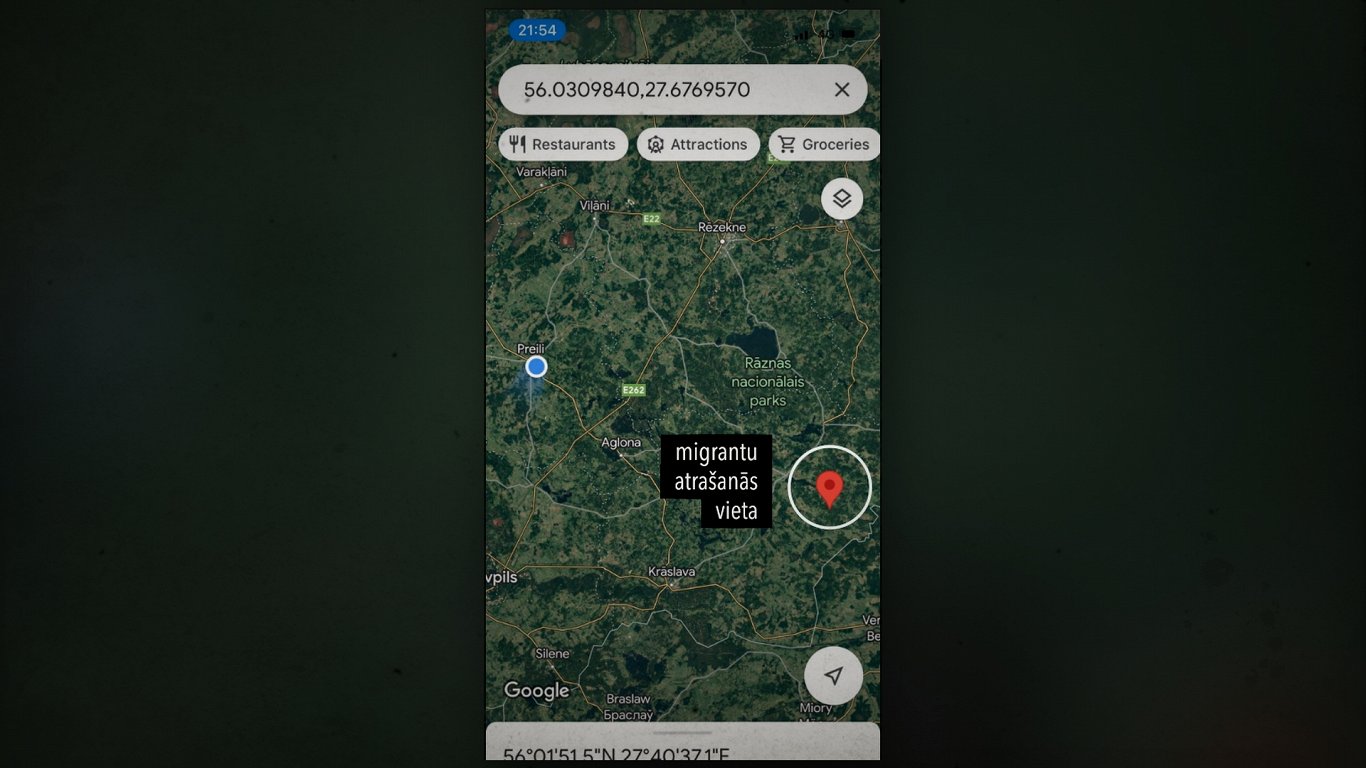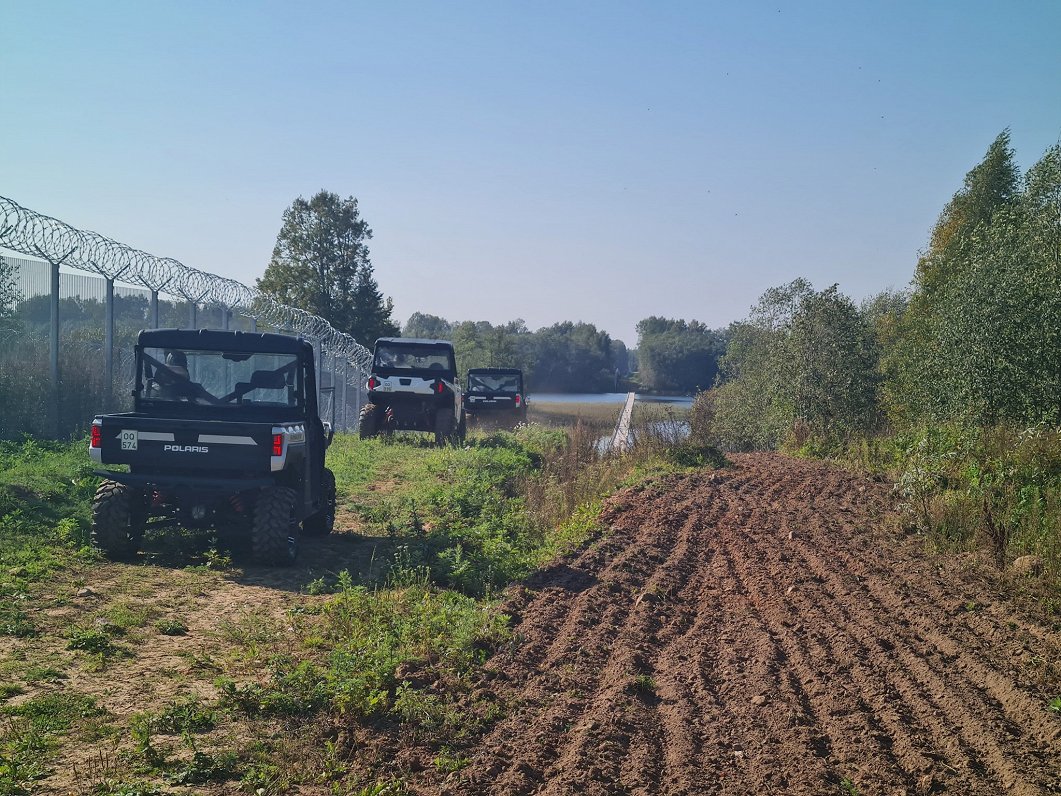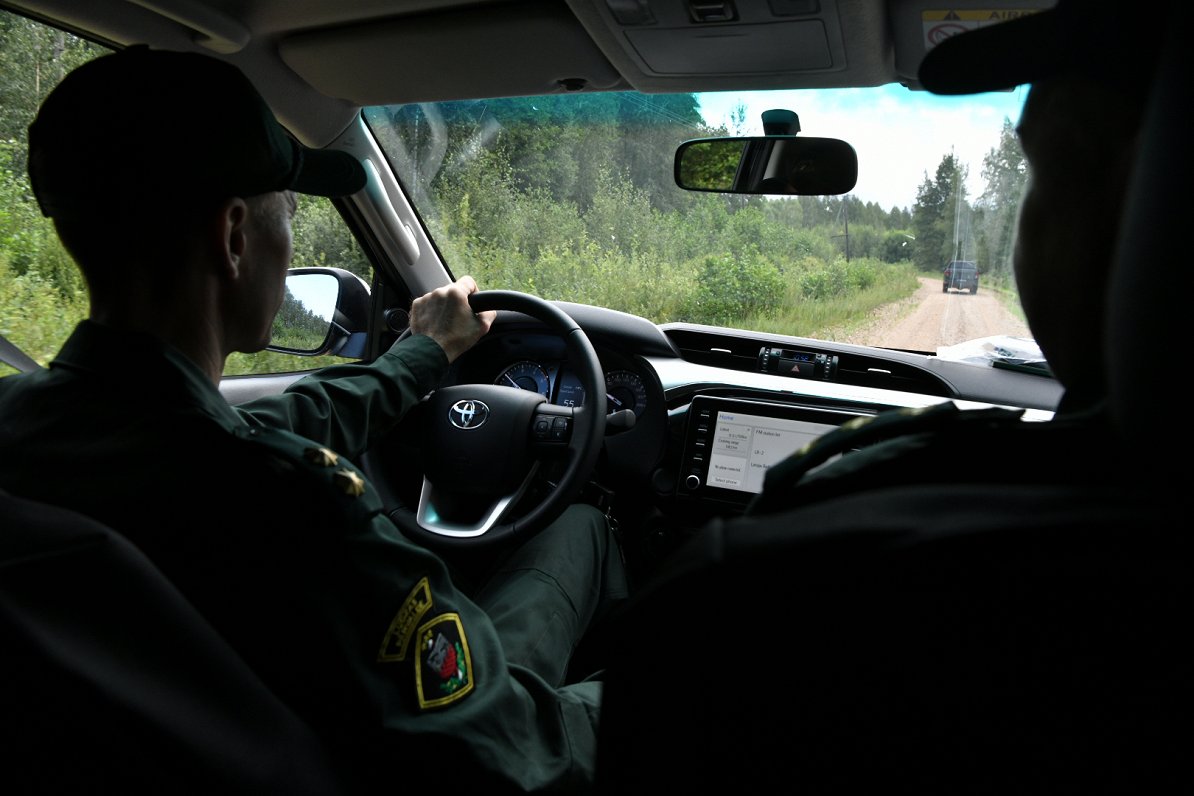So far this year, until mid-September, 9,247 attempts to illegally enter Latvia from the territory of Belarus have been prevented. It can be assumed that at least some other attempts succeeded.
The intention of the border crossers is not necessarily to reach Latvia itself, but to travel on to countries in Western Europe once they have made it into the EU. To do this they require the help of others – professional people smugglers.
To find out more, LTV journalists went under cover to investigate, skirting the limits of the law themselves and infiltrating people smuggling rings. They exposed migrant transport routes, communication networks and the preferred methods used by people smugglers to evade the law.
September 14 – reply to an ad
AP began its probe by responding to a suspicious advertisement placed on the TikTok social media site in which drivers were urgently sought. The call took them to a conference call with several people. The boss is Amir. No one's face is visible, and the conversations are in Arabic with Russian translation. A man named Nazar translates.
Nazar: Tell me, please, do you have drivers with or without a car?
AP: How do you need it? Well, basically I'm alone, if you need someone else, I can find them for you.
Do you already understand the essence of work or not?
Not really. Can you tell?
I understood that we need drivers who will pick up people from the Belarus - Latvia border and take them to Germany.
OK, good.
If you are ready for such an adventure, then I can tell you more.
After AP agrees to this proposal, there is an offer for two types of trips – people should be taken to Germany from Rīga or directly from the eastern border. The second option is, of course, more complicated.
Nazar: You can collect from the border, we send you a place there, you roughly look, orient yourself, go and check the road and evaluate your options. Look, orient, drive and test the road and assess your chances, whether it is possible to collect or not.
AP: There is no need to go to Belarus?
No, no, they will already be in Latvia. They will be there 10.7 kilometers from the border with the Republic of Belarus. They are close to the road, they will need to be collected and taken out. And then leave for Germany.
Who are these people, are they migrants?
Yes, they are migrants. (..) They are there illegally.
And what happens if you get caught there? Or don't pick them up?
There are definitely risks there.
What risks?
There are risks, but you won't get that kind of profit anywhere else. (..) So look, we will pay 1,600 dollars per person from the border to Germany.
Payment takes place only after the work is completed, and in cryptocurrency.
Nazar reveals that the people to be transported come from different countries, but there is no need to talk to them – you load up, drive, drop off, and receive money. You have to manage the pick-ups each day, and the more people you can take away at once, the better. If you take a minibus, you also need a car for scouting purposes.
Nazar: When you collect from the forest, for example, the accompanying car drives in, immediately checks the road, if everything is clear, then you drive in with the bus, collect people. The distance between you should be two or three kilometers. If there are police and so on, you already start going around them, don't go straight.
AP: Tell me, what about the Lithuanian and Polish borders? What do you say if you get stopped? Do these people have any documents?
They don't have any documents, so you have to do it so that you don't get stopped.
Amir is said to be one of the biggest and best service providers in this job, so the payment is guaranteed, says Nazar. His reputation is important to him.
September 15 – call from coordinator Mahir
The next day, a person calls the undercover AP team on behalf of Amir's gang, who does not give his name clearly, but let's call him Mahir. Mahir is the one who coordinates the removal of specific groups of people from specific places in the forests near the border. He urges not to be late, because there is a lot of work – he has 4 or 5 different drivers under his control. Mahir wants to know what kind of minibus the driver will use. The best are the so-called "kablukis" – a light van with a cargo box in the back.
Mahir: You know, a Volkswagen Caddy or Renault Kangoo, that kind of thing. So small, but room for 8 people.
AP: Are they willing to sit like that?
It's a bit uncomfortable.
Like herrings in a barrel.
Yes, they are sitting like that, they caught one on the Czech border, he had an Opel Zafira, but inside were 23 people.
Awful. And how were they caught?
Because the driver was stopped to check his driver's license and the car looked too low. He got scared and said, I have a bag in the trunk. Then he was told to open the trunk.
But what if someone catches you? Mahir has advice.
Mahir: For example, when driving into Poland, make a quick turn somewhere, leave the car and run. (..) Forget about them, they will be caught and sent back to the forest, they lose nothing. The main thing is you don't get caught.
AP: The border guards don't take bribes?
Unfortunately, this generation no longer does...
It's Friday, and according to Mahir, it's the best day to do jobs. The first task would be to take a group of people from the forest to some houses. In this case, not to Germany, but 90 kilometers from the Latvian-Belarusian border "to rest a bit".
He does not yet know the exact location where people will be picked up in the forest, but when the driver gets to the bus and is ready to go, he will send the information. Payment will be 200 to 250 euros per person.

September 15 – a trip to the border
Mahir asks for a photo of the car, but the license plate must be covered up first. You have to drive slowly towards the border, you have to arrive at the destination under the cover of darkness, around midnight. Where people should be taken will be revealed later on.
Mahir: That location is after you collect people.
AP: Do those people have phones?
The guide who is with them is constantly on the phone. (..) They cannot stand in one place, so when they approach, they send a specific location 20 minutes before to the person who will collect them.
The border with Belarus is about 180 kilometers long, so Mahir clarifies that you have to move up from Krāslava in the south, eventually agreeing to go to Dagda. From Riga to Dagda, which is a small town in Krāslava county, it is about 260 kilometers or a little more than a three-hour drive.
Mahir also wants to know how far the driver himself has gone, and gets him to send a screenshot of his location. At the same time, Mahir says that it is not possible to go to the forest yet, because the scouts report that there are four border guard patrols on duty around the specified point.
After more than an hour, around midnight, Mahir announces that the operation will continue around half past five in the morning.
Meanwhile the AP team decides to go to a point on the map sent by Mahir, where there should be people. There is no sign of patrols, but nor can border crossers be found.
September 16 – message from Mahir
at At 5.29 in the morning, a message arrives from Mahir.
Mahir: No one answers. In general... The guide doesn't pick up the phone, I can't make a call. It is possible that they were all taken prisoner.
Mahir promises to compensate for the driver's travel expenses and transfer 100 dollars, so that the driver can go and take a look – maybe the border crossers have simply lost contact.
AP also goes to take a look. The road is already known, but a private car can be seen near the location. Moments later, a border guard patrol stops the journalists, who explain what they are doing here. The border guards record personal data, and examine the journalist's accreditation. Passing this information on, the journalist can safely go home. But first they decide to look a bit more, wading across an overgrown meadow towards the rendezvous point. Suddenly, a man with binoculars appears.
Before anything more can be found out, the same border guard patrol arrives. This time, a man with a machine gun also gets out of the car and chases the journalist away.
Mahir is told that no border crossers have been found. Mahir promises that someone will be in contact and pay the promised $100. In fact Mahir actually transferred 100 dollars for the used fuel. The money was transferred through a Revolut account, using an intermediary. This was donated by AP to the support of Ukraine.
September 17 – complaining to Amir
After the trip, which ended without a result, the AP team decides to complain to Amir and his translator Nazar, because time and money have been wasted.
Nazar sets things straight.
Nazar: Understand, there is a human factor in this work. The order arrives, then people are caught by the border guards in the forest or the signal disappears.
An agreement is reached that next time, before the exact pick-up point in the forest is sent, the driver will not leave Rīga. Also, the address of the house to which the people should be taken will be announced in good time, Nazar promises. After this conversation, Forbidden Method soon receives the coordinates of a house on the Krāslava-Daugavpils road. The driver offers to drive on Tuesday, September 19.

September 18 – an unexpected call
On Monday morning, the Forbidden Method team receives a strange call from a man. The number has the Indonesian international code.
Unknown: Hello, hello?
AP: Hello.
It's said you have a car in Latvia?
Maybe. Who gave my number?
I don't remember anymore.
Where are you from?
I am from Belarus.
Are you a guide or what?
No, I'm not...
When do you need me? How many people?
Generally every day.
And how much for a person?
I wanted to know if you deliver, how much it costs.
From where to where?
To Germany.
After this strange call, there is communication with Mahir, who states that he has not given the number to anyone else. However, he was able to say that the number had been sent to the forest guide by Nazar, the group that should have been picked up on the previous trip.
At some point, everything seems clear - the people who were supposed to be picked up on the previous trip to the forest have been caught, but their guide's phone has fallen into the hands of the border guards. Now an investigator is trying to find out more from the driver. The border guard patrol and the man with the binoculars were also not random – they were waiting to see who would go after these people. The investigators are themselves being investigated.
September 20 – work from Mahir
Mahir announces that there is a new job – to collect two groups of people in the morning around five, and then take them straight to Germany. The price per person is 800 euros, although 1,600 was previously promised. In Germany, the border crossers should be taken to the address Berlin, Lynarstrasse 26.
The AP team agrees to the job. The 'blue dot' location for the job is received – a small forest hill in the Robežnieki parish of Krāslava district, approximately three kilometers from the border.
September 20 – call the police
This time, the journalists call and inform the police that they have received quite reliable information about the location of people who have crossed the border illegally. The police are ready to respond and search the place together with the border guard. The journalists are not allowed to participate in the operation because it is not safe.
Instead, AP goes to the previously sent home address to which people are to be taken from the border. On the way, the car and documents are checked by one police patrol and later by the border guard, too. Almost reaching the house, another police patrol appears. The journalists tell the police their story and go inside the house with armed law enforcement officers. There are no people. Everything looks abandoned. There are signs that someone has lived here, including a cigarette packet with a Belarus excise stamp. But it's hard to say when.
News soon arrives from the police about the situation near the border. 14 people have been arrested, most of them men. The police also send photo and video proof. Meanwhile, Mahir sends the driver another blue dot to collect other people. There, too, the police detain about 20 people.

Who are the detainees and what happens to them next?
Raimonds Kublickis, deputy head of the Daugavpils administration of the State Border Guard, stated that people are not identified by nationality, but based on what the persons themselves say, it can be concluded that one group of border crossers comes from Syria, and the other from India.
The border guard also does not unravel the stories of why these people choose to get to Europe in this particular way. "We do not delve into it, we do not conduct such discussions. Because the goal is to deter people and prevent them from entering the territory of the Republic of Latvia and the European Union," explained Kublicskis.
After being caught, these persons are returned to their country of departure, in this case Belarus, across the green border. Kublickis did not reveal the specific place to which the two groups of border violators were taken. It cannot be said that the dream of Germany is over for these people, because in a day or two they may try again.
"We see that there are similar persons, appearing somewhere several kilometers away after a very short period of time – the question is how they get there. This suggests that they are being transported on that side as well," Kublickis said.
In one of the earlier conversations, Mahir said that around 20 groups like Amir's are currently operating on the Latvian-Belarusian border. Also, Mahir mentioned that he himself lived in Germany, which he reached via illegal means.
"You know, I'm from Syria myself... I was once brought here by people like Amir. I am still grateful to him. Although I slept for a couple of nights where there were cattle... But I'm grateful anyway. Because my house was bombed, my parents died, I was badly injured," said Mahir.



























